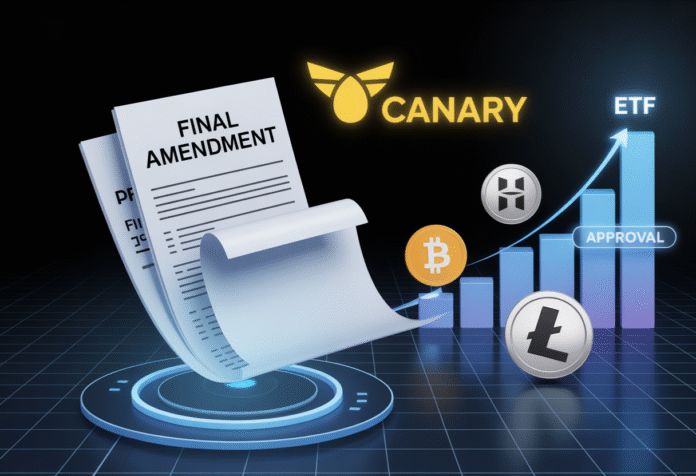Canary Capital’s Litecoin and HBAR ETFs are currently awaiting SEC approval as the U.S. government shutdown delays their launch.
Canary Capital is moving closer to launching new crypto ETFs for Litecoin and HBAR, despite delays caused by the ongoing US government shutdown.
The firm submitted final amendments on October 7 and assigned the tickers LTCC for the Litecoin ETF and HBR for the HBAR ETF. These updates stand as the last procedural step before approval.
Litecoin ETF Nears Approval Despite Delays
The Litecoin ETF is at the centre of Canary’s current expansion. The firm filed its updated S-1 registration statement, which includes a 0.95% sponsor fee and the official LTCC ticker.
INTERESTING: Canary just filed S-1 amendment for Litecoin and HBAR spot ETFs and they include the fees (95bps each) and the tickers (LTCC and HBR). which is typically the last thing updated bf go-time. With shutdown tho who knows but these docs look pretty finalized to me. pic.twitter.com/xSahgxzhtl
— Eric Balchunas (@EricBalchunas) October 7, 2025
This filing was made under the SEC’s new single-window review framework, which was introduced in September. The revised rule replaces the old two-step process with a faster 75-day review period. It is also intended to make crypto ETF approvals more efficient.
The SEC missed the initial October 2 deadline for the Litecoin ETF due to the shutdown. However, the Nasdaq has already submitted the required 19b-4 form to list the product.
ETF analysts say that Canary’s detailed filings are evidence that the company is fully prepared to launch once the SEC resumes its operations.
HBAR ETF Builds on Canary’s Institutional Trust Product
The proposed HBAR ETF extends Canary’s previous institutional-only trust offering, which launched last year. The public ETF application was filed in February. The recent amendment confirms the 0.95% sponsor fee and sets the ticker as HBR.
My take on the 95bp fee. It's pricey vs spot btc, but pretty normal to see higher fees for areas that are new to being ETF-ed and increasingly niche. That said, if there's flows other issuers will no doubt come and Terrordome that sht with cheaper products.
— Eric Balchunas (@EricBalchunas) October 7, 2025
The HBAR ETF’s 240-day review window is set to end on October 29. Interestingly, analysts note that Hedera’s regulatory profile and compliance with the Securities Act of 1933 show that it has a relatively straightforward path to approval.
SEC Shutdown Slows Progress but Launch Remains on Track
The U.S. government shutdown that started on October 1 has left the SEC operating with minimal staff. As a result, all non-essential regulatory actions, including crypto ETF approvals, are delayed.
Canary’s filings show that it has completed the final pricing and branding steps, which are normally the last updates before approval. Analysts believe that both the Litecoin and HBAR ETFs could be launched quickly after normal SEC functions resume.
The new listing framework is designed to reduce long-term delays, so the current holdup is most likely related to the shutdown, not to extra regulatory hurdles.
ETF Analysts See High Readiness for Launch
Popular ETF analysts have shown optimism about the products’ future so far. Eric Balchunas of Bloomberg, for example, noted that the final amendments to the filings are “typically the last thing updated before go-time.”
His colleague James Seyffart says the same and believes that “Litecoin and HBAR ETFs are at the goal line here.” Both analysts agree that approval is highly likely once the SEC resumes its standard reviews.
The product’s 0.95% sponsor fee is higher than the average for spot Bitcoin ETFs, which often range from 0.15% to 0.25%. Balchunas explained that higher fees are common for newer or more specialised ETFs. He also said that if these funds draw strong inflows, other issuers may enter the market with lower-cost alternatives.
Growing Demand for Altcoin ETFs
Canary’s focus on Litecoin and HBAR shows an ongoing demand for crypto investments. Many institutional investors want exposure to more than just Bitcoin and Ethereum.
The approval of these ETFs would stand as a milestone expandig access to altcoin-focused products in the US market. Analysts from Bitfinex predicted earlier that the launch of altcoin ETFs could create fresh interest and could even trigger an altcoin rally.
The planned XRP and Solana ETF applications indicate that Canary intends to be a major player in the altcoin ETF space. Stronger access to these products could improve the integration of digital assets into trad-fi markets.





